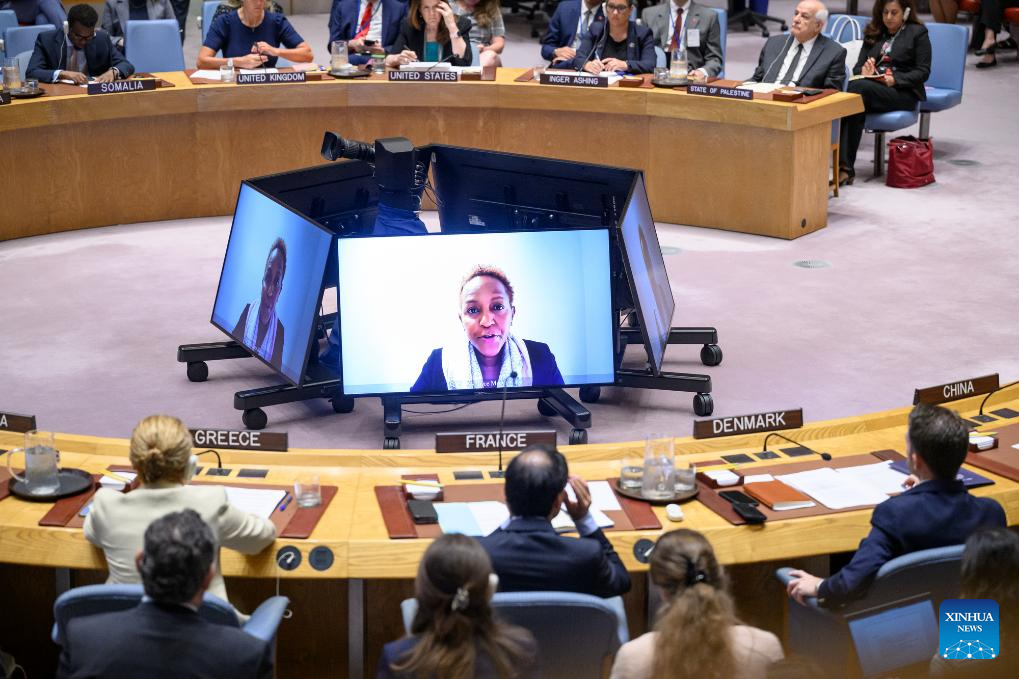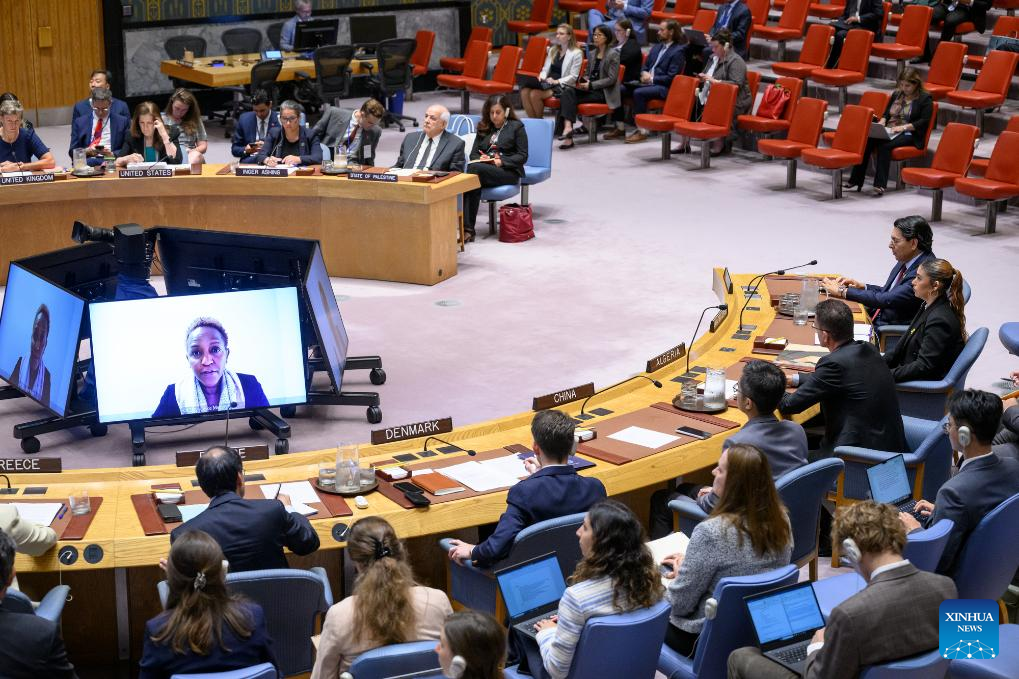UN urges cessation of hostilities to halt famine expansion in Gaza
Source: Xinhua
Editor: huaxia
2025-08-28 04:48:45

UN Assistant Secretary-General for Humanitarian Affairs and Deputy Emergency Relief Coordinator Joyce Msuya (on screens) briefs the Security Council via a video link on the Middle East, including the Palestinian question, on behalf of Under-Secretary-General for Humanitarian Affairs and Emergency Relief Coordinator Tom Fletcher, at the UN headquarters in New York, on Aug. 27, 2025. The UN humanitarian chief on Wednesday called for an immediate, sustained cessation of hostilities in Gaza to prevent further loss of life and to stop famine from expanding. (Loey Felipe/UN Photo/Handout via Xinhua)
UNITED NATIONS, Aug. 27 (Xinhua) -- The UN humanitarian chief on Wednesday called for an immediate, sustained cessation of hostilities in Gaza to prevent further loss of life and to stop famine from expanding.
Over half a million people currently face starvation, destitution and death. By the end of September, that number could exceed 640,000, said UN Under-Secretary-General for Humanitarian Affairs and Emergency Relief Coordinator Tom Fletcher in a briefing to the Security Council delivered on his behalf by his deputy, Joyce Msuya.
The Integrated Food Security Phase Classification (IPC) Famine Review Committee on Friday confirmed that famine is occurring in Gaza and is projected to expand further to Deir al-Balah and Khan Younis cities by the end of September, noted Fletcher.
He said that approximately 1 million people are in IPC Phase 4. And over 390,000 are in IPC Phase 3. Virtually no one in Gaza is untouched by hunger.
IPC Phase 3 means an acute food and livelihood crisis. IPC Phase 4 means humanitarian emergency, one step before IPC Phase 5, which means famine.
At least 132,000 children under the age of 5 are expected to suffer from acute malnutrition between now and mid-2026. The number of those at risk of death among them has now tripled to over 43,000. For pregnant and breastfeeding women, that number is predicted to surge from 17,000 to 55,000, said Fletcher.
"Let us be clear: this famine is not a product of drought or some form of natural disaster. It's a created catastrophe -- the result of a conflict that has caused massive civilian death, injury, destruction and forced displacement," he said.
The famine in Gaza is also the result of a destroyed food production system where 98 percent of the cropland is damaged or otherwise inaccessible, and where livestock is decimated, he said, adding that 22 months of restricted and compromised delivery of essential humanitarian and commercial supplies, degraded health and nutrition systems, lack of adequate shelter, and broken water, sanitation and hygiene networks, also caused the famine.
Last month, over 100 Palestinians, on average, were killed every day, according to estimates by Gaza's health authorities, nearly twice the average daily toll recorded in May. In the same period, some 800,000 people were newly displaced, pushed into overcrowded areas that lack shelter and other essentials, said the UN humanitarian chief.
There has been an uptick in aid entering Gaza over the past weeks, including in the number of trucks and fuel tankers. Limited commercial traffic has also resumed in the past weeks. And, after a long pause, supplies of animal fodder have resumed over the past several days, he said.
"These are important developments. But they will neither reverse famine nor stop it in its tracks. To meet the needs of 2.1 million starving and hungry people, we need much, much more. We need to bring in and deliver greater volumes of life-saving assistance. We need the restrictions on essential items to be lifted. And we need a halt to the delays and denials that undermine our work every day," according to Fletcher.
He warned that failure to act now will have irreversible consequences, saying that the Security Council and all UN member states must act immediately to ensure an immediate, sustained cessation of hostilities in Gaza, the immediate and unconditional release of all hostages, and the protection of civilians and critical infrastructure.
Also, they must ensure safe, rapid and unimpeded humanitarian access, and the restoration of commercial flows of essential goods at scale, market systems, essential services and local food production, said Fletcher.
"Ending this human-made crisis demands that we act as if it were our mother, our father, our child, our family trying to survive in Gaza today. We must all do more, and quickly," said the UN humanitarian chief. ■

UN Assistant Secretary-General for Humanitarian Affairs and Deputy Emergency Relief Coordinator Joyce Msuya (on screens) briefs the Security Council via a video link on the Middle East, including the Palestinian question, on behalf of Under-Secretary-General for Humanitarian Affairs and Emergency Relief Coordinator Tom Fletcher, at the UN headquarters in New York, on Aug. 27, 2025. The UN humanitarian chief on Wednesday called for an immediate, sustained cessation of hostilities in Gaza to prevent further loss of life and to stop famine from expanding. (Loey Felipe/UN Photo/Handout via Xinhua)



